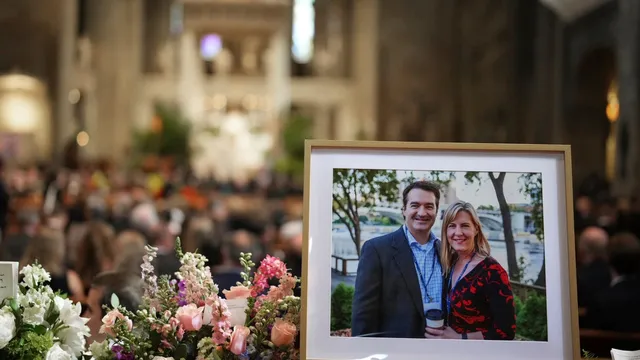
Man charged with murder of Minnesota House speaker and lawmaker
2025-07-03 23:02- Vance Boelter is charged with multiple offenses, including two counts of murder for the shootings of Melissa Hortman and John Hoffman.
- The shootings on June 14 were described as politically motivated and have raised concerns about the safety of lawmakers.
- This high-profile case has led to intense scrutiny of jail conditions and the treatment of the suspect, emphasizing the seriousness of political violence.
Express your sentiment!
Insights
In the United States, Vance Boelter, aged 57, is under scrutiny for a series of violent incidents that occurred on June 14, resulting in the deaths of former Minnesota House Speaker Emerita Melissa Hortman and her husband Mark. The shootings also left state Senator John Hoffman and his wife Yvette injured, but they survived the ordeal. Following a manhunt, Boelter was apprehended at his home after the shootings, which local authorities are describing as politically motivated attacks against lawmakers. The attacks began in the early morning when Boelter, reportedly disguised as a police officer, shot Senator Hoffman and his wife at their residence before proceeding to murder Hortman and her husband just hours later. These actions have been deemed a significant threat to democracy, and federal prosecutors are treating it as a politically motivated assassination attempt. Boelter's situation in jail has been contentious, with claims of harsh treatment and sleep deprivation being contested by the Sherburne County Sheriff, who asserts that the conditions are standard for inmates. On multiple occasions, during court appearances, Boelter expressed his concerns over the jail conditions, suggesting they hinder his ability to prepare for his defense. He requested special accommodations, such as reduced lighting in his cell to help him sleep, which have not yet been defined by the court. Despite these complaints, the courts maintained that security concerns necessitated the existing conditions. Notably, Boelter has yet to enter a formal plea as federal indictments are required, which are expected to take place after the ongoing legal proceedings. Boelter is facing serious federal charges including two counts of murder, two counts of stalking, and multiple firearm-related offenses. His possible conviction could lead to the death penalty, given the severity of his actions and the implications they hold for public safety and democratic processes. The investigation is still evolving, but it has sparked widespread concern around the safety of elected officials and the increasing violence directed toward them amid the contemporary political landscape. Both local and federal authorities are prioritizing this case due to its implications, leading to a direct pursuit of justice.
Contexts
Political violence poses a significant threat to democracy, undermining the foundational principles of governance and citizens' trust. The impact of this violence can be assessed through various lenses, including the erosion of civil liberties, the stifling of political dissent, and the general destabilization of a nation's political infrastructure. When political violence occurs, it often leads to a climate of fear, prompting citizens to withdraw from democratic processes such as voting, campaigning, and public discourse. This withdrawal not only diminishes the democratic legitimacy of elected officials but also fosters an environment where autocratic tendencies can flourish. Furthermore, it creates an atmosphere where dialogue and compromise are replaced by aggressive confrontation, negatively influencing the political culture of a society. One of the critical ways in which political violence affects democracy is through its impact on electoral integrity. Instances of violence before, during, or after elections can intimidate voters and disrupt the electoral process. Such disruptions can lead to lower voter turnout and questions regarding the legitimacy of election outcomes. For example, in cases where violence is prevalent, elections might be postponed or deemed unsafe, resulting in an incomplete representation of the electorate's will. This undermines the core democratic principle of consent, where the government derives its authority from the governed, and can lead to prolonged political instability or even civil unrest. Moreover, political violence tends to disproportionately affect marginalized groups, further entrenching social inequalities and divisions within society. These groups often find themselves at the forefront of political violence, whether as victims or as participants, leading to their marginalization in the political decision-making process. When voices of dissent are silenced through intimidation or violent actions, crucial perspectives on governance and policy-making are lost, narrowing the scope of democracy. This creates a vicious cycle where the disenfranchisement of certain groups fuels further violence and unrest, making it even more challenging to foster a robust and inclusive democratic environment. To counteract the adverse effects of political violence on democracy, it is essential for governments, civil society, and international organizations to work collaboratively towards reconciliation and peace-building efforts. Establishing dialogue between opposing factions, promoting human rights, and ensuring accountability for acts of political violence are vital steps towards restoring trust in democratic institutions. Additionally, creating safe spaces for political expression and encouraging civic engagement can help to mend the fabric of society that is often torn apart by violence. Ultimately, combating political violence is not only about addressing its immediate consequences but also about fostering a culture of democracy where all citizens can participate freely and actively in the political life of their nation.